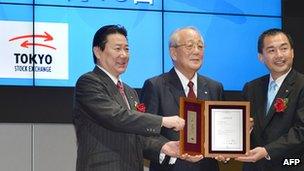Beer with boss Kazuo Inamori helps Japan Airlines revival
- Published
Mr Inamori explains how he managed to turn around the fortunes of Japan Airlines
"I am a complete amateur in the transport industry."
That is not the line you would expect from the newly appointed leader of an airline, especially one at the heart of one of the biggest corporate failures in the aviation history.
But those were the exact words of Kazuo Inamori - who is now credited with Japan Airlines' (JAL) dramatic revival - less than three years ago.
The carrier had just filed for bankruptcy with more than $25bn (£16bn) of debt. The government stepped in to bail it out and the 80-year-old founder of hi-tech giant Kyocera was its choice as the new chairman.
"I declined the offer numerous times because I had no clue about airlines," he tells the BBC.
"I didn't even know that JAL had such a huge debt until it went bust," he laughs.
With little experience in the sector, he was not the only person who was sceptical. Friends and family also advised him against accepting it.
But despite those objections, he took the job - without pay - because "if we couldn't revive JAL, it would have been a huge blow to Japan's economy which was already struggling", he says.
Three years later, JAL is making money again and has relisted on the Tokyo Stock Exchange.
Of course, a huge injection of taxpayers' money helped. Its rival All Nippon Airway has been criticising JAL for having an unfair advantage.
But under Mr Inamori's leadership, the carrier shed about a third of its workforce, trimmed employee benefits and reduced unprofitable routes.
Culture shock
He says his biggest challenge was to change JAL's "rigid and bureaucratic" corporate culture. Until its privatisation in 1987, Japan Airlines was owned by the government for more than three decades.
"I felt very uncomfortable because the company didn't feel like a private firm at all," Mr Inamori recalls.
"Many former government officials used to get golden parachutes into the firm so I am not saying that it was all JAL's fault.
"But even then, I was surprised that there was no true leader who could unite all the staff during the crisis," he adds.
So how did he manage to change such a deeply rooted corporate culture?
"My simple philosophy is to make all the staff happy," he says. "It has been my golden rule since I founded Kyocera when I was 27.

Mr Inamori has overseen a turnround in JAL's fortunes including its relisting on Tokyo Stock Exchange
"Not to make shareholders happy but simply to create the company that every employee is proud to work for," he adds.
"Many people were sceptical if such a simple philosophy would work but in the end, it did."
Soon after his appointment, JAL issued a small booklet of Mr Inamori's philosophies - he was ordained as a Buddhist priest - and held compulsory sessions for staff to attend.
However, not everyone welcomed the moves initially.
That is when he unleashed another secret weapon.
"I brought six cans of beer after these sessions or to people who were working late," he says.
"After a beer or two, people opened up and told me their honest opinions."
The tactic is known as nommunication in Japan - communication with drinks to have less formal business chats. And he says using it has paid its dividends.
"It really feels that all of our employees are united now, which is the key to the company's revival," Mr Inamori says.
Future leaders?
The dramatic turnaround of JAL is one of a few success stories from Japan Inc in recent years.
The economy, once the world's second largest, has been overtaken by China.
Its electronics makers, which used to dominate the industry, have been losing out to their overseas rivals.
Mr Inamori says the downfall has been partly caused by the lack of strong business leaders.
"What puzzles me is why Japan's economy has been struggling for the last 20 years because we have the technologies, skills and great people.
"But I guess people got too complacent after the economy grew spectacularly since the end of World War II.
"Today, we are lacking strong business leaders who can make difficult decisions and be inspirational, people who work hard for the good of the company, not for their personal gains."
The government's persistence to appoint Mr Inamori to JAL's top job in 2009, just before he turned 78, may prove his point - that the country does not have younger leaders to rely on for such a challenging task.
Mr Inamori represents a generation of Japanese businessmen who supported the country's dramatic recovery after the war.
He helped to revive the carrier which was once seen by many as a symbol of the country's post-war boom.
But not only is Japan's legacy fading fast, but the people who drove it are also now in their 70s and 80s.
JAL may have been lucky to have had Mr Inamori to lead its revival. But the question remains if Japan has raised the next generation of strong businessmen who can confidently lead the industry.
It's not every day that an "amateur" can succeed like Mr Inamori did with JAL.
- Published2 November 2012
- Published2 November 2012
- Published19 September 2012